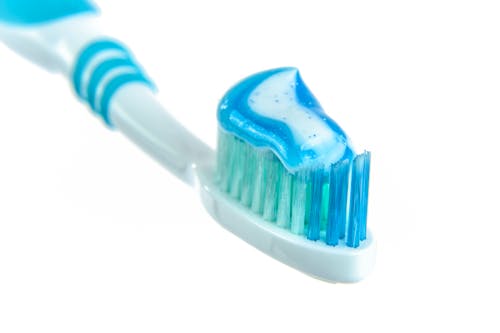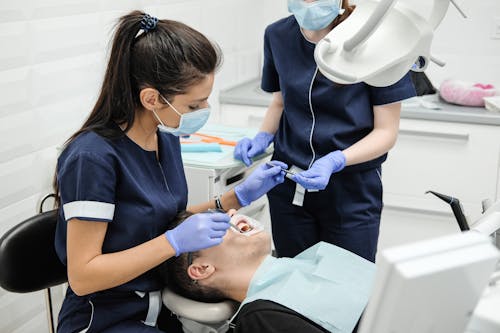
Some oral health mistakes are more common than others, but there are plenty of mistakes people make when it comes to properly caring for their teeth. In fact, many of us take the health of our teeth for granted, and fail to responsibly care for them.
It has likely been ingrained in your brain since you were a young child that brushing your teeth before bed and flossing regularly will keep your pearly whites healthy. However, though both habits seem very easy and simple to do, you may be surprised to learn you’re doing them incorrectly.
It’s also fairly common for people to make a lot of other oral hygiene mistakes that they may not be aware of, such as failing to properly research their dentist, or not consuming enough calcium.
According to the US CDC or Center for Disease Control, more than 80% of people will develop at least one cavity by the age of 34. Based on statistics, it’s fairly obvious that something is wrong with our oral hygiene habits if many people suffer these teeth and gum issues. Notably, you may be more prone to getting tooth decay based on your family history. If tooth decay is a higher risk for you because of your DNA, you’ll want to be even more cognizant of avoiding these oral health mistakes.
Although your genetics plays a significant role in a predisposition towards cavities and tooth decay, your genes are not the only variable. Overall lifestyle and oral hygiene habits play a major role in one’s teeth health. The health of your teeth is not to be taken for granted, because you’d be surprised how much can go wrong if you neglect your teeth. Check out the most common oral health mistakes people make which may contribute to rising oral health issues:
1. Brushing Immediately After Eating
Though all dentists recommend brushing after every meal, they do not necessarily mean that you should get your toothbrush and do it as soon as you put your fork down. Most dentists suggest brushing your teeth at least 30 minutes to an hour after mealtime. Brush your teeth 1 hour after you’ve eaten acidic foods. The reason for this is that sugars and acids in the food you just ate temporarily weaken your teeth’s enamel. Thus, when you brush right away, you wear out the enamel faster. Waiting will protect your teeth and ensure the enamel is not tampered with.
2. Being Excessively Vigorous While Brushing
The concept of, “the harder you brush, the better you clean” is a myth when it comes to oral health. Being overly aggressive can result in enamel abrasion and gum recession over time. As a result, this can lead to loss of tooth structure. Moreover, it can make your teeth and gums more sensitive. For best results, use a soft-headed toothbrush and be mindful of how much pressure you apply. Signs that you’re a harsh scrubber include:
- Frazzled brush head within a month or two
- Gums begin receding
- Teeth become sensitive to hot or cold foods
If you want to break this aggressive brushing habit, stick with a soft toothbrush. There are also electric toothbrushes available with a pressure indicator.

3. Insufficient Time Spent Brushing
Although you may brush your teeth 2-3 times per day, the more important consideration is: are you allocating enough time for brushing? If you fail to spend sufficient time brushing your teeth, it increases the likelihood of biofilm and tartar formation. When you don’t remove this nasty gunk from your tooth surface, it will lead to the following:
- Plaque deposits
- Inflammation of gums
- Halitosis or bad breath
- Cavities
Don’t brush in a hurry. Give yourself ample time to get the job done to make sure you hit the back areas of the teeth. That’s primarily where most cavities form. For best results, use a timer on your phone and set it for 2 minutes. You can also buy a sonic toothbrush with its built-in timing mechanism.
4. Failing to Properly Research When Selecting a Dentist
It’s common for people to need to find a new dentist if they have moved to a different city or neighbourhood. When you’re looking for a new dentist, you need someone reputable who you can trust.
One of the most common oral health mistakes is to arbitrarily select a dentist simply based on proximity. Don’t just pick the dentist closest to you without doing your research.
Similarly, don’t just randomly select a dentist from a list of practitioners that your insurance covers. Go the extra mile and do your research to avoid dealing with dental malpractice. Some patients seek dentists that have general liability insurance for added security when it comes to possible dental malpractice.
Before you choose a dentist, check reviews, look at the dentist’s credentials, ask if they have general liability insurance, ask about treatment options and pricing, and check out the dental clinic to inspect for cleanliness and professionalism.
Sadly, many reports state that there is a rising number of malpractice litigation cases in the field of dentistry. There are many cases of dental malpractice such as:
- Misdiagnosis
- Incorrect treatment
- Infection
- Complications with anesthesia
- Treatment delays
- Lack of informed consent
Some dentists will convince you that you need something you do not need, just to make money. This is another reason why it’s important to find a dentist you can trust. Choosing a dentist to cover your needs and those of your family’s, especially when you have growing kids, shouldn’t be done haphazardly or arbitrarily. Take your time to get to know the dentist and the entire team, reading online reviews and testimonials. Examine the facility to make sure you’re comfortable in their office. A good dentist will inspire trust and confidence.

5. Not Seeing the Dentist Often Enough
How long has it been since you last saw your dentist? Neglecting your teeth is a common problem. Being irresponsible and putting off dentist visits is one of the worst oral health mistakes you can make. If you’re putting off seeing your dentist because of a busy schedule or general disinterest, you’re doing yourself a disservice. You shouldn’t only see your dentist when you feel tooth pain. By the time that happens, there’s a strong possibility that you’re dealing with a serious issue. Consequently, bigger problems are not just painful but more complex to treat, take longer recovery periods, and are more expensive as well.
For this reason, preventive health is a necessity when it comes to your oral health. Taking out the plaque with bi-annual dental prophylaxis treatments with your dentist is so much easier and cheaper than treating cavities, getting root canals, and other more invasive solutions. Bear in mind, research shows that plaque cannot be fully removed by simply flossing and brushing. The same goes for more advanced forms of gum disease. All of these issues require professional deep cleaning on a regular basis. Thus, if you fail to see your dentist at regular intervals for a well-check-up, could hasten tooth decay and the formation of gum disease. Mark your calendar and set an appointment every 6 months, and don’t let it go longer than that.
6. Not Flossing Enough
Some people cease flossing because they see blood on the string and notice their gums bleed when they do it. Don’t stop when this happens because your gums could be acclimatizing to regular flossing. The more you floss, the less you bleed, and all the better your oral health will become. Bear in mind, flossing takes out food debris that gets stuck in the mouth. If you don’t take them out, they harden into plaque and tartar. Once that happens, you need professional cleaning to remove them.
However, if you’ve been flossing regularly and following good oral hygiene habits, bleeding gums can be a symptom of gingivitis. In this instance, you should schedule an appointment with the dentists to prevent infection and other complications.
7. Using the Wrong Brand of Toothpaste
Not all toothpastes are created equal. Resist those sales on random toothpaste brands, because certain formulations may not serve you well. You must examine your toothpaste and ensure it contains the minimum amount of therapeutic ingredients, which are essential to help you maintain a mouth free of cavities.
For best results, ask your dentist for toothpaste recommendations. For example, Sensodyne is recommended for sensitive teeth and bleeding gums since it minimizes inflammation. On the other hand, if you have cavity issues, toothpaste with a fluoride component is essential. Your dentist will suggest the best toothpaste suited for your unique needs to ascertain optimal oral health.

8. Always Starting in the Same Place When Brushing Your Teeth
One of the most common problems that people commit is they begin brushing their teeth in the same position each time. Out of habit, they don’t even realize that they’re committing this error. If you belong to this group, you may want to shake things up and vary your routine. Starting in the same position every single time you brush means that area gets more attention. Consequently, you get uneven results because other parts of your mouth are usually neglected. If you want to protect your teeth and gum health, be more mindful about how and where you brush. Make it a habit to spend equal amounts of time in all areas of your teeth.
9. Neglecting the Gums and Tongue
Brushing should not just be for the teeth. If you want superior oral health, don’t forget about your gums and tongue. Bacteria build-up just as much in these areas. So technically, even if the task is called “toothbrushing,” you must also pay attention to your gums and tongue. Gently brush these areas to remove bacteria and promote better blood circulation. Failure to do so means you put yourself at risk for gum disease and bad breath.
10. Using the Wrong Toothbrush
It can be confusing to go shopping for a toothbrush because there’s a broad range of products out there. They come in different shapes, sizes, and bristles. If you have a habit of picking a random toothbrush, you could be setting yourself up for a disaster. For example, if you have a small mouth and buy a large toothbrush, you could end up missing the deep corners in the back. The larger brush could also potentially hurt your teeth and gums. Pay attention to your toothbrush. If you have sensitive teeth, pick one with softer bristles. If you have a tiny mouth, use a smaller head.

11. Not Drinking Enough Water
The body is made up of around 60% water, so this compound is essential to your oral health. It prevents dry mouth, which is one of the reasons you could end up with bad breath. If you live in an area with safe tap water, it contains fluorides and other minerals which help your teeth fight cavities and strengthen enamel. Even purified water is good for you because not drinking enough water, especially after meals, means you don’t get to cleanse your mouth of food debris, especially sugar which coats tooth enamel, and bacteria. Insufficient water intake is one of the biggest oral health mistakes you can make.
12. Lack of Calcium and Vitamin D Intake
Do you have sufficient calcium and vitamin D intake? Studies indicate that if you lack these nutrients, your body will end up getting the calcium stores in your bones and teeth. As a result, this puts you at an elevated risk for osteoporosis and tooth decay. You need vitamin D because it is the component that helps your body absorb calcium. Speak with your doctor about taking supplements, especially if you are lactose intolerant or live in a place with insufficient sunlight.
Take Oral Care to the Next Level
Many people make oral health care mistakes without even realizing they’re doing it. If you want to take care of your teeth and gums correctly, be more mindful of your oral hygiene practices. You must also visit your dentist regularly to prevent cavities, gingivitis, and other problems, as well as carefully selecting a reputable dentist.
Take prevention to the next level by a DNA test to find out if you are genetically prone to oral health issues such as tooth decay. This will encourage you to be even more health-conscious when it comes to your oral health practices.







Comments are closed.